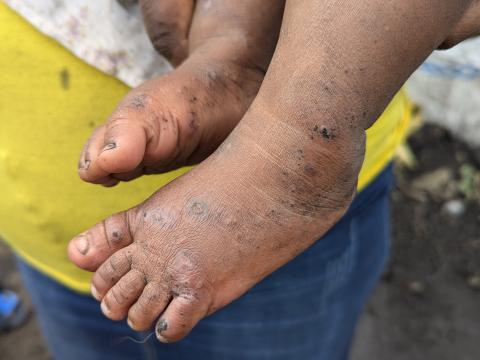DR Congo: Internally Displaced Persons, Mostly Children More Exposed to Mpox Following Overcrowding In Camps In The East of The Country

By Jacques Bouda, Communications Specilaist
In the Democratic Republic of Congo, the Mpox epidemic is exacerbating an already complex situation for the population in general, but especially for internally displaced persons (IDPs) in sites that are already overcrowded as a result of the insecurity and humanitarian crisis. The real challenge this epidemic poses at various sites is compliance with barrier measures.
Respecting the measures of distanciation and hygiene in the conditions that displaced people live in overcrowded sites with needs for shelter, protection, water, hygiene and sanitation remains challenging.
The huge numbers of displaced people are causing a number of hygiene and protection problems in these IDPs sites. The Mpox epidemic declared in the DRC remains a risk for women and children living in the camps. IDP sites could become favourable environments for the spread of the disease if prevention mechanisms are not put in place in time.
New IDPs arriving at these sites spend 3 months in sheds due to a lack of shelter. These sheds house more than 50 people. Adults and children live there while waiting for shelter assistance.
We have nowhere to wash. We don't even know where to go or where to change our underwear because we live with our fathers-in-law and sisters-in-law. And even going to the toilet at night becomes a problem. That's how we live here because there are so many people, including children’, says Charmante*, a displaced woman living in the Kashaka IDPs camp.
Children most affected by Mpox
As a result of the poor hygiene and overcrowding in the camps, some children have been infected with Mpox.
‘I noticed that my daughter had Mpox when she started to have a fever at night, and then I noticed the rash on my child's hand’, says Promesse*. Promesse quickly realised that her daughter was suffering from the disease after attending an awareness-raising session on the symptoms of Mpox.
"I had already been shown a photo of the symptoms of this disease, and I saw the symptoms appearing on my child's face. The signs started to appear on her body, and that's how I recognised the illness we were talking about. I immediately decided to go to hospital, where I was given medication for my child. "
At the health centre, her child received all the treatment needed to stabilise his health. Back at home, aware that the barrier measures could enable her to prevent all her children from being contaminated, she also asked the other children to go to their grandmother's house to prevent them from being contaminated. It was very difficult for her, her husband and their 10 children to respect the barrier measures in their shelter, which is too small for a large family.
‘When the daughter came down with the disease, I told her brother and the other children to go and stay with their grandmother. I stayed with my husband, and I also told him to stay away from us so as not to catch the disease’, she recounts.
As a breastfeeding mother, Promesse could not respect the barrier measures with her daughter. Promesse was also contaminated with Mpox. According to Promesse*, there are many challenges to preventing Mpox in IDP sites. The shelters in which the families are housed make it impossible to comply with barrier measures. When there is a case of Mpox in a shelter, the inhabitants are quickly exposed and could contract the disease. She also raised the issue of hygiene and sanitation, which also remain challenges in the sites.
Mpox survivor protects her family
All the children at Promesse have now returned to their shelter, and she is taking steps to prevent them from contracting the disease. She has also set up a makeshift hand-washing facility in front of their shelter and is urging her children to wash their hands regularly to avoid contracting the disease. ‘
When I left hospital I was told to respect the distancing measure. I told my children to keep their distance, to wash their hands, and I took care of the child myself to avoid contaminating the others’, she adds.
According to Promesse*, the best solution to prevent the spread of this disease in the IDP site is vaccination.
As part of its response to Mpox, World Vision is continuing its awareness-raising activities, as well as its food distribution and cash distribution activities in IDP sites, taking care to ensure that the recommended measures for combating Mpox are respected.
Names have been changed for the dignity of Mpox survivors